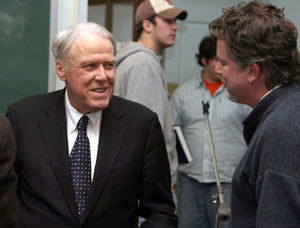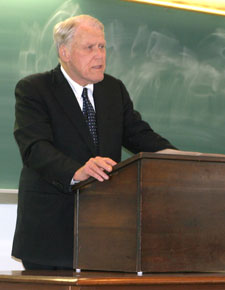Judge John T. Noonan of the United States Court of Appeals for the Ninth Circuit, California, told a large gathering of Wabash students and faculty Wednesday that the religion of a judge does not influence rulings in our nation’s courts. See photos from the 33rd Annual David W. Peck Awards Banquet.
 Noonan spoke on the Wabash campus before Wednesday night’s Peck Awards Banquet honoring the jurist and scholar. The Peck Medal honors the late David W. Peck ’22, a Harvard law graduate and New York attorney who was chief justice of the New York Appellate Court and a long-time member of the Wabash Board of Trustees.
Noonan spoke on the Wabash campus before Wednesday night’s Peck Awards Banquet honoring the jurist and scholar. The Peck Medal honors the late David W. Peck ’22, a Harvard law graduate and New York attorney who was chief justice of the New York Appellate Court and a long-time member of the Wabash Board of Trustees.
Noonan’s late afternoon presentation was titled, "The Religion of the Judge: Does it make a Difference?" The judge studied the rulings of five Catholic Supreme Court judges and reflected on his own career. He found the judges used a clear standard of law and not their religious beliefs to vote and write on some of the most important cases in our country’s judicial history.
He said it was usually "not religion, but fidelity to the Constitution that provided the guidance to deciding a case."
The senior judge and professor of law emeritus at Berkley said a judge’s conscience, the people before him and the law determines a ruling. "What enters into a judge’s judgment is the judge’s life experience," Noonan said. "It’s not the politics of the President who appointed him."
 He said the education, life experience, and "a myriad of influences go into making a judge the judge he is."
He said the education, life experience, and "a myriad of influences go into making a judge the judge he is."
Noonan holds a Ph.D. from Catholic University and a law degree from Harvard. He has written 13 books dealing with religion, law, philosophy and history. His books are used in Wabash classrooms.
For attorney, Assistant Professor of Political Science, and alumnus Scott Himsel ’85, Noonan represents the unique combination of distinguished jurist and leading scholar.
"His career is a wonderful testament to the fact that we have scholars on the bench," Himsel said. "It shows every one how significant that can be to administering justice, because that person can really draw on all the resources that are available. When you’re dealing with things that are as difficult and as gut-wrenching as some of the issues that come before the 9th circuit, what a great well to draw upon and it’s surfaced very well with Judge Noonan for 20 years."
Noonan held the large crowd captive with his mixture of research, historical perspective and personal experiences.
"It was fascinating to see someone who's at the heart of the American judiciary, whose work we've read and studied in class," Travis Ross '06 said.
Wabash’s strong reputation for pre-law students and outstanding religion department made the judge’s visit a perfect fit.
"We have a number of students on this campus who are extremely interested in religion and its intersection with the law," Himsel said. "I attribute a lot of that to the fact that for many decades we’ve had one of the best religious studies departments in the country. So our students come with a much greater sophistication than about religion than you’re going to find almost anywhere else."
Sophomore Jeremy Burton ’07 said Noonan’s remarks changed some of his perceptions of the law.
"His closing remarks were inspirational," Burton said. "I came away from my Common Law class frustrated with the Supreme Court. Noonan has a totally different view with his thoughts on conscience; he showed a human side of the law. I think his views bring stability to the law with regards to religious conflict."
In photos:
Top Right: Judge Noonan talks with History Professor Stephen Morillo.
Lower Left: Noonan delivers his prepared remarks.
Homepage photos:
On Homepage: Noonan signs a copy of one of his books for Joseph Rutski '07.
On Faculty/Staff homepage: Professor Stephen Webb, Himsel, and Judge Noonan share thoughts after the afternoon speech.